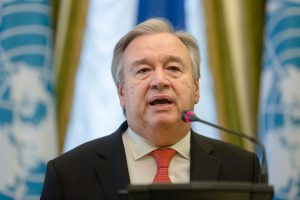Up to 2,000 North Koreans are being held in Chinese detention centers for leaving North Korea without permission, for residing illegally in China, or for coming officially to work in China but not wanting to return. Their forced repatriation by China may be imminent, since North Korea is expected to reopen its borders soon.
Increasingly, eyes are turning to U.N. Secretary-General Antonio Guterres as international appeals grow for the release of the North Koreans held in China. At a hearing in Washington, D.C., of the Congressional-Executive Commission on China, its chair, U.S. Representative Chris Smith, appealed to Guterres to “please use your influence to the utmost to dissuade the Chinese government from forcibly repatriating these refugees.”
If returned, the North Koreans will be severely punished. The U.N. Commission of Inquiry (COI) report of 2014 provides ample evidence of the systematic beatings, torture, detention, forced labor, and in some cases, execution of those who left North Korea illegally, in particular those who tried to reach South Korea. A 2020 report of the Office of the UN High Commissioner for Human Rights (OHCHR) further documented the “appalling” treatment, including sexual violence, to which North Korean women are subject when returned. Because of the persecution they will face, the COI concluded that North Koreans who leave their country without permission merit international protection: they are refugees sur place.
What can the U.N. secretary-general do to defend these people?
First, Guterres can use the stature of his office to bring attention to the problem. His press spokesperson said on June 13 that the secretary-general “stands for the respect of international refugee law and against refoulement.” But it would be far more powerful if Guterres spoke directly and sought a solution for the North Koreans.
China signed the 1951 Refugee Convention, which prohibits the return of refugees to conditions of danger; it also acceded to the Convention against Torture, which prohibits the return of anyone “in danger of being subject to torture.” Clearly, China needs to be reminded of its obligations, which the secretary-general can do with authority. When Guterres was U.N. High Commissioner for Refugees (UNHCR), he raised the question of forced repatriation with China when he visited in 2006. And in 2013, he expressed grave concern about a group of North Koreans China was expected to return: “UNHCR is deeply concerned about the safety and fundamental human rights of these individuals if they are returned” to North Korea.
Were he to make an appeal today, it would establish that the secretary-general gives prominence to the issue of human rights in North Korea, not only its weapons program. And it would help eviscerate China’s thin rationale that the North Koreans are illegal migrants, not refugees, who will face no punishment upon return.
Indeed, Guterres would do well to reveal that UNHCR staff, when allowed access to the China-North Korea border in the mid 1990s, classified starving North Koreans as refugees, because they were subject to North Korea’s politically discriminatory food distribution policies. To squash such findings, China barred UNHCR from the border in the late 1990s, and in 2008 ended the access of North Koreans to the UNHCR office in Beijing, which had helped small groups of North Koreans to depart. China’s collusion with North Korea in undermining the Refugee Convention through bilateral agreements that treat asylum seekers as criminals must be stopped.
Second, Guterres should use his good offices to create a contact group of states to find a diplomatic solution. The group should include governments that can effectively raise the issue with China, countries affected by the refugee problem, and countries prepared to house North Koreans temporarily while their future is determined. To be sure, South Korea considers North Koreans to be its citizens, but in the current political climate, other countries in Asia might be better suited to take in the North Koreans as a first step.
Third, the secretary-general should call upon UNHCR, the agency set up to defend non-refoulement, together with the Office of the High Commissioner for Human Rights to develop strategies for gaining safe passage for the North Koreans. UNHCR China’s website doesn’t even mention North Koreans, although it lists other “persons of concern” who can be registered by UNHCR. Furthermore, while noting the “de facto integration” of more than 300,000 Indochinese refugees, it makes no mention of the tens of thousands of North Koreans hiding in China who would find integration a protective measure from Pyongyang’s persecution. China instead has been cracking down on North Korean workers on its territory and also on North Korean women married to Chinese men, whom the authorities sometimes separate from their children and husbands to forcibly return them to North Korea.
The refugee problem in China is not a large one, but it is a very cruel one. Current High Commissioner for Human Rights Volker Turk has extensive experience with refugee protection, as does the current High Commissioner for Refugees Filippo Grandi. The International Organization for Migration could also help. But leadership is needed for a multilateral effort of governments and the United Nations. In the past, following diplomatic intercessions, China on occasion has allowed North Koreans to depart its country. Now is the time for an intercession led by the highest level of the U.N.

































